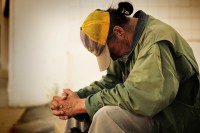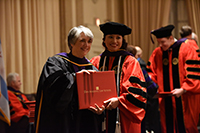
As published by Chicago Sun-Times
The men congregate in small groups near Cermak and Western, others around 47th and Ashland.
What they have in common is that they are homeless heroin addicts who say they were sent here under false pretenses by police and government officials in their native Puerto Rico with promises of drug treatment programs that never materialized.
By a way of treatment, the men were thrown into unlicensed support groups demanding they quit cold turkey, and when they ultimately relapsed, they wound up living on Chicago’s streets.
What those men also now have in common is a fierce pair of advocates in Carolyn Boyd and Melissa Hernandez, who have made it their personal mission to help them.
I told you about Boyd back in November.
She’s the bookkeeper by day and angel by night who three evenings a week goes home after work, cooks a meal for 65-75 homeless people and then drives around to deliver it to them in the city’s nooks and crannies where they try to survive.
I’ve never met a person with a bigger heart, which in a way makes the organization she founded, Humble Hearts, a bit of a misnomer.
There have been two big changes with Boyd since I followed her around the city last fall.
The biggest is that Hernandez, Boyd’s effervescent personality clone, has joined Humble Hearts as her partner in charity to share the workload in their self-directed humanitarian effort.
The second is that together they have taken up the cause of the Puerto Rican homeless men, some of whom they had only just met when WBEZ aired an investigative report in April about the problem.
On Monday, Hernandez rounded up seven of the men whose trust she and Boyd have been cultivating and brought them to Rincon Family Services in Humboldt Park to get them started in methadone treatment.
Boyd and Hernandez, who say they know of approximately 100 homeless Puerto Ricans living mostly on the Southwest Side, had hoped more of the addicts would respond to their treatment offer. But they were gratified to be off to a good start.
“We’re going to get everybody into rehab, one person at a time,” Boyd had told me Friday as she and Hernandez whipped through their rounds, never too busy to hug the homeless people and tell them they loved them.
Sen. Willie Delgado (D-Chicago) helped pair Humble Hearts with Rincon, the long-time leading social service provider to the Puerto Rican community.
“We’re more than willing to help, and hopefully others will join us,” said Rolando Correa, Rincon’s president and CEO, who cut some red tape to get the men into treatment immediately.
A trio of John Marshall Law School students was also on hand to offer legal services to the men and to further their own investigation into how they got here and who profited.
One of the men, Miguel Martinez Perez, 40, said he first was sent to Chicago four years ago by Puerto Rican authorities who offered him a choice because of his drug addiction: either go to jail there or accept a one-way ticket to a top-notch medical facility in Chicago that could help him beat his addiction.
“It was a complete deception,” Perez told me in Spanish through an interpreter.
The medical facility turned out to be an unlicensed storefront clinic relying on prayer, tough love and corporal punishment.
In a story that is typical, Perez said the group took his identification, helped him sign up for a Link Card and then confiscated it from him, using the card to buy food that was sold back to him.
In an unusual twist, though, Perez said he was able to return to Puerto Rico twice, only to be arrested again and sent back here both times.
I asked Perez how he supports his drug habit, and he didn’t hesitate in his response. He said he steals.
This situation is not new. From what everybody tells me, it’s been going on at least a decade, which only makes it that much more important that somebody stop the cycle.
Humble Hearts’ next step: find housing for the men.

